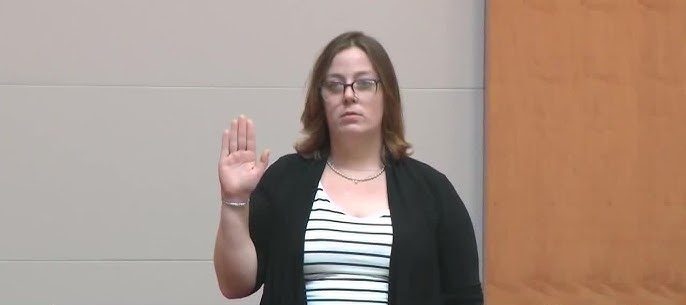Daughter of Baseball Hall of Famer Avoids Jail Time After Leaving Newborn in Freezing Woods.
The story of Alexandra Eckersley, daughter of famed Baseball Hall of Famer Dennis Eckersley, has captivated the nation. On a frigid night in December 2022, Alexandra was accused of abandoning her newborn in the freezing woods of New Hampshire and misleading first responders about the infant’s location. After a lengthy legal battle, a New Hampshire court ruled that Alexandra will not face jail time, provided she adheres to strict conditions related to her mental health and substance abuse treatment.
The Shocking Christmas Incident
The harrowing events unfolded in the early hours of December 26, 2022, when the Manchester Police Department received a 911 call from a woman claiming to have given birth outdoors near the West Side Ice Arena. That woman was later identified as Alexandra Eckersley, the 27-year-old adopted daughter of Dennis Eckersley, the former MLB pitcher. Temperatures in Manchester that night had dipped below 20 degrees Fahrenheit, adding a chilling urgency to the situation.
According to authorities, Eckersley initially misled first responders by providing incorrect information about the location of her baby. It wasn't until nearly an hour later that she directed them to the actual spot, where they found the newborn. The child was immediately rushed to a hospital for treatment after being exposed to the freezing temperatures.
Related: Rosie O'Donnell's Daughter Chelsea Arrested: A Troubled Family Saga of Addiction and Estrangement
The Legal Case: Guilty, But No Jail Time
In August 2023, a jury found Alexandra Eckersley guilty of several charges, including endangering the welfare of a child, reckless conduct, and falsifying evidence. Notably, she was acquitted of two assault charges. The case highlighted the complexities of the criminal justice system when mental health issues are involved.
On October 12, 2023, New Hampshire Superior Court Judge Amy Messer sentenced Eckersley to a 12-month sentence for falsifying evidence and a six-month sentence for endangering a child. However, in a pivotal decision, Judge Messer suspended both sentences, meaning that Eckersley will not serve jail time if she continues her treatment and complies with court requirements for the next three years.
“It’s essential for you to stay on the current path you’re following,” Judge Messer said during sentencing. “I believe that if you maintain this course, success will follow.”

May 30, 1977: Dennis Eckersley
Mental Health and Addiction in Focus
Throughout the trial, Eckersley’s defense attorney, Kim Kossick, emphasized that her client’s actions were largely influenced by mental health struggles and substance abuse. The defense argued that Eckersley’s primary goal was to live a stable life and care for her child. Currently, Eckersley has custody of her child and resides with her mother in Massachusetts.
Mental health played a crucial role in the court’s decision to suspend the jail sentences. Judge Messer’s ruling reflects a broader societal shift in how courts address individuals who face criminal charges while also battling mental illness and addiction. Rather than focusing solely on punishment, the ruling aims to encourage rehabilitation.
Related: 6 ways to take care of your mental health at work
Prosecutors Push for Jail Time
Despite the defense’s arguments, the prosecution pushed for a harsher sentence, with Assistant Hillsborough County Attorney Alex Gatzoulis recommending at least a year of jail time. The prosecution alleged that Eckersley had deliberately misled first responders about her newborn’s location, placing the child at severe risk.
“The state’s recommendation today is significant and justified,” Gatzoulis said in court. “The evidence presented during the trial clearly indicates that Ms. Eckersley was aware of her actions and deliberately misled the first responders.”
Eckersley’s then-boyfriend, 45-year-old George Theberge, also faced legal repercussions. Theberge pleaded guilty to child endangerment related to the incident and was sentenced to one year in prison.
Rebuilding a Life: What’s Next for Alexandra Eckersley?
While Alexandra Eckersley has avoided jail time, her future hinges on her ability to stay on the path of recovery. She is required to continue her mental health and substance abuse treatment and must regularly check in with the court to ensure compliance. The suspended sentence serves as a form of conditional leniency — a second chance dependent on her ability to maintain her progress.
For Eckersley, who has already been through significant public scrutiny, this ruling marks the beginning of a new chapter. Her attorney has expressed optimism that she will be able to build a stable life for herself and her child.
The Role of Mental Health in Legal Decisions
The Eckersley case underscores a growing recognition of the role mental health plays in the criminal justice system. It raises important questions about how courts should balance accountability with compassion for individuals facing significant mental health challenges.
This case also highlights the growing importance of rehabilitation and treatment over punishment, particularly for non-violent offenders. Many experts argue that addressing the root causes of behavior — such as addiction and mental illness — can lead to more successful outcomes, not just for individuals, but for society as a whole.
The case of Alexandra Eckersley is both tragic and hopeful. It serves as a reminder of how fragile life can be, but also how the criminal justice system is evolving to offer pathways to recovery. With her sentence suspended, Eckersley now has an opportunity to focus on her health, her family, and her future.
As Judge Messer said during sentencing, success is possible if Eckersley continues on the path she is currently following. It is now up to her to seize this second chance.
Related: The Menendez Brothers' Money






















